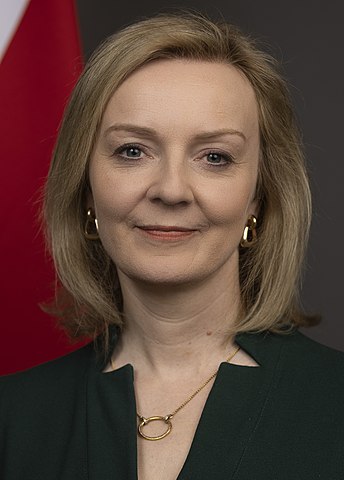Liz Truss is the new prime minister of the UK – the fourth Conservative in six years.
Two weeks into office on September 23, her new chancellor Kwasi Kwarteng announced the biggest series of tax cuts in 50 years – hailed by the government as the start of a new era intended to promote economic growth, criticized for mostly benefitting the rich and already privileged, sparking chaos in financial markets, and prompting a precipitous polling fall in public support for the Conservative party.
The UK pound and stock market fell sharply with both the FTSE index and the pound down around 2% or more.
Perhaps more importantly there was chaos in debt markets for days as traders worried about a leap in unfunded borrowing; interest rates jumped and lenders withdrew up to half their loan products in an uncertain market.
The government was forced to reverse its plan to cut the 45% highest rate of income tax, promise to publish details on how the cuts will be paid for sooner than planned, and hold an unusual emergency meeting with the Office for Budget Responsibility (OBR) responsible for analysing UK public finances.
The central Bank of England stepped in with an emergency promise of £65 million to buy government bonds to prevent a fire sale of gilts and protect pension funds which would have been forced to sell long-term government debt as part of their fund management.
Those combined moves partly calmed the markets with both the pound and the FTSE back up to pre “mini-budget” levels by October 7.
But interest rates remained raised hurting mortgage borrowers, the housing market, businesses, and the longer term outlook for government debt rates.
On October 10 Kwarteng said he would bring forward his fiscal plans and economic forecasts to October 31, nearly a month earlier than the previously scheduled date of November 23 in a further attempt to calm the financial markets.
His fiscal statement was expected to detail how the chancellor intended to pay for an estimated £43billion of tax cuts and cut debt. And the OBR was to release its forecast of how the economy will perform in coming years at the same time.
A preliminary OBR report was handed to the government on October 7 – after the lack of such a report to accompany Kwarteng’s “mini-budget” on September 23 helped spook the markets in the first place. The OBR had actually provided a forecast before Kwarteng’s mini-budget and offered to update it in time but he had refused to allow its publication.
Also on October 10 the Bank of England announced new safety net measures including a doubling of the maximum size of its debt buy-backs – and the Treasury announced it had appointed experienced civil servant James Bowler as its new permanent secretary.
He will replace Tom Scholar as the top Treasury official – fired on Prime Minister Truss’ first day in office in what the leader of the senior public servants’ union called “an ideological purge”.
On Scholar’s sacking, former Tory chancellor Lord Philip Hammond said he was “disappointed but not surprised. I’m a little a bit alarmed about what has become a bit of a trend in British politics for incoming prime ministers to fire senior civil servants or at least manoeuvre them out of the door. This is something we’re used to seeing in the US. It has all sorts of negative consequences. It undermines a very strong principle and tradition we have that the civil service is a continuing non partisan service.”
Public opinion polls showed a startling drop in support for Liz Truss and the governing Conservatives with Labour jumping to a lead of up to 30 points over the Tories depending on the poll – after two weeks of the financial chaos undercut quick action by Truss on the cost of living crisis.
On her second full day in office she announced a plan to cap energy costs for consumers for two years and support for businesses for 6 months – as well as controversial promises to restart fracking for shale gas and increase domestic oil and gas production. The plans did raise questions about costs and funding and were criticized by opposition parties, charities, economic think tanks, and investment analysts.
Public opinion polling had earlier shown a recent consistent lead for the opposition Labour party and a public deeply sceptical about Liz Truss’ leadership including a significant fall in her ratings through the August leadership campaign.
The government’s tax cuts and other measures included:
- cutting the basic rate of income tax from 20% to 19% – estimated to save 31 million taxpayers an average £170 a year
- abolishing the 45% highest rate of income tax – a tax cut of £55,000 for people earning £1 million said Torsten Bell, chief executive of the Resolution Foundation think tank
- cancelling a planned rise in corporation tax to 25%
- removing the cap on bankers’ bonuses
- cutting stamp duty on home purchases by doubling the thresholds at which it will apply
- cancelling the rise in National Insurance payments which was originally said to be aimed at supporting the NHS and social care
- cutting taxes for businesses in designated “investment zones” for 10 years
- legislating to require trade unions to put pay offers to a member vote so strikes can only be called once negotiations have fully broken down
- legislating to cut restrictions to building new roads, rail and energy infrastructure
- forcing people on social service benefits to work more
Prime Minister Truss admitted her tax cuts would disproportionately benefit the rich.
“I don’t accept this argument that cutting taxes is somehow unfair,” she said. “I mean, what we know is that people on higher incomes generally pay more tax. So when you reduce taxes, there is often a disproportionate benefit because those people are paying more taxes in the first place.
“We should be setting our tax policy on the basis of what is going to make our country most successful, what is going to deliver that economy that benefits everyone in this country.”
The opposition Labour party said the measures would “reward the already wealthy”, were an “admission of 12 years of economic failure” by Conservative governments, and would not boost economic growth as it will be funded by unnecessary borrowing instead of a windfall tax on oil and gas firms.
“This is casino economics – gambling the mortgages and finances of every family in the country to keep the Tory party happy,” Shadow Chancellor Rachel Reeves said.
The independent think tank the Institute for Fiscal Studies called the plan a “gamble”.
Director Paul Johnson referenced Prime Minister Ted Heath’s chancellor Anthony Barber in the 1970s as he commented:
“Barber’s ‘dash for growth’ then ended in disaster. That Budget is now known as the worst of modern times. Genuinely, I hope this one works very much better.”
Liz Truss was confirmed as the new leader of the Conservative party on September 5.
The former foreign secretary was elected Conservative leader by 81,326 party members, beating former chancellor Rishi Sunak in a six-week leadership campaign. Sunak received 60,399 votes.
The party says 83% of its eligible 172,000 members voted, with Truss taking 57.4% – a smaller share than any of her predecessors – and Sunak 42.6%.
That’s around 0.3% of about 46 million registered voters in the UK.
Boris Johnson used his last speech as ousted prime minister to note what he considered his major achievements – Brexit, the vaccine rollout, and support for Ukraine – and possibly to hint at a return to power through a reference to obscure Roman leader Cincinnatus. There has already been speculation about a possible Boris comeback.
In her first speech as prime minister Liz Truss first praised Johnson and then promised action on rising energy bills and the cost of living crisis, saying she would focus on the economy, energy, and the NHS and make Britain “an aspiration nation”.
The Politico website has listed a total of 149 promises she made while campaigning for the leadership.
Even before the mini budget fallout, she faced a wide and difficult range of issues – a faltering economy beset by fast rising costs, inflation and widespread strikes, a National Health Service with major staffing and systemic issues, a long unresolved dispute over the Brexit Northern Ireland protocol which has shut down its parliament and caused friction with the EU, a continuing struggle over the Scottish government’s wish for an independence referendum, and ongoing issues with immigration – to name a few.
Liz Truss appointed prime minister – Sept.6
Kwasi Kwarteng “mini budget” – Sept.23
Currency, stock, debt markets react
London Stock Exchange FTSE index chart
Pound plummets chart
Liz Truss and Kwasi Kwarteng u-turn – Oct.3
Kwarteng to bring forward fiscal plan – Oct.3
Kwasi Kwarteng to speed up debt plan details – Oct.4
Bank of England says bond intervention avoided financial crisis – Oct.6
Debt, pound, stock markets recover – Oct.4
Small business sounds alarm over debt – Oct.5
Kwarteng advances date of fiscal plan and forecast details – Oct.10
Bank of England announces additional measures – Oct.10
Emergency talks planned with OBR – Sept.29
The Office for Budget Responsibility
Preliminary OBR forecast – Oct.7
Kwasi Kwarteng refused to release OBR figures – Sept.20
Why delay the OBR forecast
Truss fires top civil servants – Sept. 6
Top Treasury civil servant fired
Public voting intention polls listing
Politico – Poll of polls
Liz Truss approval ratings after Tory conference – Guardian
Liz Truss out of sync with public – FT
Kwasi Kwarteng’s key mini budget points
Changing economic direction – FT
Rewarding the rich – Liz Truss
Rewarding the rich – Labour
Gambling the future – IFS
Liz Truss announces energy price plan – The Guardian
Liz Truss announces energy price plan – FT
Labour slams lack of windfall tax
Analysis from Institute for Fiscal Studies
Questions from industry
At least five questions about the energy plan
Energy plan unveiled – as it happened
Liz Truss first address to the nation
Liz Truss full address
Liz Truss wins Conservative party leadership
Narrowest leadership win in 20 years
The leadership contest
The New York Times on how the UK selects a new leader
A long list of 149 leadership campaign promises
Who is Liz Truss
The Liz Truss cabinet
Boris exits
Boris hints at comeback?
Backbench Boris
Tory MP plot to bring back Boris?
Truss not better than Johnson?
Britons disappointed that Liz Truss is next Prime Minister – YouGov
Truss poll ratings fall during leadership campaign – Opinium
Keir Starmer leads Truss on leadership – Ipsos
Election opinion polling summary – Wikipedia
Sterling levels – Sept.8
Impact of falling pound – Sept.7








